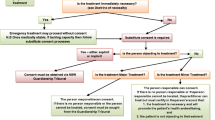Abstract
Here we describe how more important findings were obtained in a delirium study by using an informal assessment of mental capacity, and, in those who lacked capacity, obtaining consent later when or if capacity returned or a proxy was found. From a total of 233 patients 23 patients lacked capacity as judged by our informal capacity judgment and 210 did not. Of those who lacked capacity, 13 agreed to enter in the study. Six of them regained capacity later. When these 13 participants were excluded from analysis, significant findings were no longer evident. These results show that by the inclusion of subjects who lacked capacity the results of analyses of the condition from whish they suffer are altered. We suggest that this approach to the study of delirium is more ethical than the usual system of strict exclusion of people who lack capacity to give consent and for whom assent is not available.
Similar content being viewed by others
References
Miller, R. R., III, & Ely, E. W. (2007). Delirium and cognitive dysfunction in the intensive care unit. Current Psychiatry Reports, 9(1), 26–34.
Siddiqi, N., House, A. O., & Holmes, J. D. (2006). Occurrence and outcome of delirium in medical in-patients: a systematic literature review. Age and Ageing, 35, 350–364. doi:10.1093/ageing/afl005.
Elie, M., Cole, M. G., Primeau, F. J., & Bellavance, F. (1998). Delirium risk factors in elderly hospitalized patients. Journal of General Internal Medicine, 13(3), 204–212. doi:10.1046/j.1525-1497.1998.00047.x.
Young, L. J., & George, J. (2003). Do guidelines improve the process and outcomes of care in delirium? Age and Ageing, 32(5), 525–528. doi:10.1093/ageing/afg094.
Siddiqi, N., & Harding, R. (2006). Challenges of research and how to implement a guideline. Paper presented in the conference Delirium: From science to services Leeds 16th November 2006.
Vollmann, J., & Winau, R. (1996). Informed consent in human experimentation before the Nuremberg code. BMJ (Clinical Research Ed.), 313(7070), 1445–1449.
World Medical Association Declaration of Helsinki. Ethical Principles for Medical Research Involving Human Subjects (as amended by the 52nd WMA General Assembly, Edinburgh: October, 2000).
General Medical Council. Accessed February 4, 2007 [http://www.gmc-uk.org/guidance/current/library/consent.asp#37].
Council of Europe (1997). Convention for the protection of human rights and dignity of the human being with regard to the application of biology and medicine: Convention on human rights and biomedicine. European Treaty Series - No. 164 1997.
Goffin, T., Borry, P., Dierickx, K., & Nys, H. (2008). Why eight EU Member States signed, but not yet ratified the convention for Human Rights and Biomedicine. Health Policy (Amsterdam), 86(2–3), 222–233. doi:10.1016/j.healthpol.2007.10.011.
Adamis, D., Martin, F. C., Treloar, A., & Macdonald, A. J. (2005). Capacity, consent, and selection bias in a study of delirium. Journal of Medical Ethics, 31(3), 137–143. doi:10.1136/jme.2002.000919.
Adamis, D., Treloar, A., Martin, F. C., Gregson, N., Hamilton, G., & Macdonald, A. J. (2007). APOE and cytokines as biological markers for recovery of prevalent delirium in elderly medical inpatients. International Journal of Geriatric Psychiatry, 22(7), 688–694. doi:10.1002/gps.1732.
Wilson, K., Broadhurst, C., Diver, M., Jackson, M., & Mottram, P. (2005). Plasma insulin growth factor-1 and incident delirium in older people. International Journal of Geriatric Psychiatry, 20(2), 154–159. doi:10.1002/gps.1265.
Coats, T. J. (2006). Consent for emergency care research: the Mental Capacity Act 2005. Emergency Medicine Journal, 23(12), 893–894. doi:10.1136/emj.2006.041640.
Matthews, E. (2000). Autonomy and the psychiatric patient. Journal of Applied Philosophy, 17(1), 59–70. doi:10.1111/1468-5930.00140.
Plato. (1929). Menexenus. In Timaeus, Critias, Cleitophon, Menexenus, Epistles (R. G. Bury, Trans.). Cambridge, MA: Harvard University Press.
Author information
Authors and Affiliations
Corresponding author
Rights and permissions
About this article
Cite this article
Adamis, D., Treloar, A., Martin, F.C. et al. Ethical Research in Delirium: Arguments for Including Decisionally Incapacitated Subjects. Sci Eng Ethics 16, 169–174 (2010). https://doi.org/10.1007/s11948-009-9120-y
Received:
Accepted:
Published:
Issue Date:
DOI: https://doi.org/10.1007/s11948-009-9120-y




